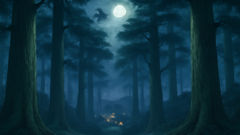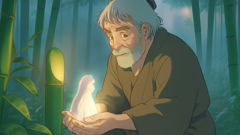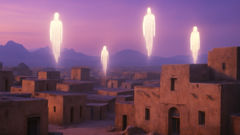Introduction
In the far reaches of medieval Japan, where mountains climbed towards the sky and forests grew so thick they seemed to muffle the sun, there stood a tiny village known as Hanamori. The villagers lived by the rhythms of the earth, tending rice paddies by day and huddling close by their fires at night, sharing stories as old as the cedars surrounding them. The heart of the village pulsed with ancient customs, and every home bore symbols carved to ward off spirits from the deep woods. Yet, despite their reverence for nature and ritual, the people of Hanamori lived in the shadow of a legend far older and darker than most dared to speak aloud.
They called it the tsurube-otoshi—the "falling bucket"—a monstrous yokai said to haunt the tallest cedar trees. By moonlight, as villagers returned home from the forest's edge, tales whispered that something would drop from the canopy: a monstrous, gaping mouth, or a head as large as a washtub, descending in silence until it snatched away the unwary. Some said it was the wrath of neglected forest gods; others insisted it was the lingering spirit of a wronged soul. Whatever its origin, one thing united the stories: those who vanished beneath the cedars at night were seldom seen again, and the tsurube-otoshi was always blamed.
The elders remembered a time when the forest was friend and provider, but recent years had brought a change. The woods grew thick with fog, and even in daylight, an uneasy hush had settled—a warning carried on the wind. Young Riku, whose family had lived for generations in Hanamori, grew up listening to the warnings. He knew never to wander past the bamboo fence after dusk, and his grandmother's eyes would flicker with fear whenever the trees rustled on moonless nights. Yet, curiosity burns bright in youth, and Riku could not help but wonder: What was the tsurube-otoshi? Was it truly a monster, or was there a deeper truth hidden within these ancient tales?
One autumn, as the leaves turned flame red and gold, something changed in Hanamori. Livestock disappeared, lanterns left burning at the forest's edge were found shattered, and strange, deep gouges appeared on the ancient cedars. Fear swept the village, and old rituals were revived in desperation. Riku, determined to protect his family and uncover the truth behind the legend, resolved to face the darkness in the forest. He would discover what dwelled among the shadows—and in doing so, would learn about the delicate balance between humankind and the spirits of nature.
The Vanishing and the Unraveling
As autumn’s chill settled over Hanamori, the forest seemed to breathe with a life of its own. The villagers moved with quiet urgency, gathering fallen chestnuts and mushrooms before the light failed. Riku’s mother, Masayo, warned him each day: 'Be home before the sun slips behind the mountain.' But one evening, as dusk painted the sky with bruised purples and deepening blue, Riku lingered to watch the crows gather in the trees. Their cries seemed sharper than usual, almost as if warning him to leave. He hurried home along the forest path, heart pounding with every snap of twig behind him.

That night, Hanamori’s peace shattered. Shiro, the miller’s youngest son, vanished on his way home. His sandals were found beside a cedar with bark torn as if by claws, but there were no footprints, no signs of a struggle. The villagers gathered in anxious clusters, eyes darting to the darkening woods. Elders whispered old prayers and hung straw charms from every doorway, hoping to appease whatever watched from the trees.
Riku’s curiosity warred with fear. He questioned his grandmother, Tomiko, who was known for her stories. She sighed and sat by the fire, her gaze lost in the shifting flames. 'When I was a girl, the forest was gentle,' she said. 'But spirits change when disrespected. The tsurube-otoshi punishes those who forget their place.' She spoke of offerings left in hollows and songs sung at planting time—customs fading as the village modernized. Tomiko’s voice dropped to a whisper. 'There are things older than our fears. Sometimes, the mountain wants to be left alone.'
Determined to help his friend and family, Riku sought out the village’s reclusive shrine keeper, Kenta. Kenta’s home perched on a mossy slope, surrounded by carved stones and fox statues. The old man was wary at first, but Riku’s earnest plea softened him. In a room thick with incense, Kenta revealed a tattered scroll: ink drawings of monstrous mouths, wide as buckets, with wild eyes peering from cedar branches. He told of rituals neglected and boundaries crossed—a village growing careless with its promises to the spirits. 'The tsurube-otoshi is not only a beast,' Kenta warned. 'It’s the forest’s memory. It remembers everything.'
The next day, Riku joined Kenta in renewing old offerings: rice scattered at sacred roots, sake poured for unseen eyes, a song hummed beneath breathless branches. For a moment, the forest felt lighter. Yet that night, the monster struck again. This time, it was Riku’s own father who disappeared while checking snares by lantern light. Grief gripped Riku’s family, and the village sank into hopelessness. Many spoke of fleeing; others blamed outsiders or suspected witchcraft. But Riku, shaken yet resolute, could not accept defeat. He would face the tsurube-otoshi himself. In secret, he fashioned a talisman from woven grass and a bit of his father’s sash, vowing not to let fear rule him. Armed with stories, prayers, and a stubborn hope, Riku waited for the right night to enter the heart of the cedars, determined to unmask the legend—and perhaps save those taken by its shadow.
Into the Depths of the Haunted Forest
The night Riku chose was thick with cloud and shivering wind. Lantern in hand, he slipped from his home, heart thumping a frantic rhythm as he passed the bamboo fence and entered the forest’s maw. The air grew colder with each step; leaves whispered warnings in a tongue he almost understood. Shadows pressed close, and the scent of moss and wet earth filled his lungs. Every childhood story seemed alive here—he could almost see flickers of movement at the corner of his eye.
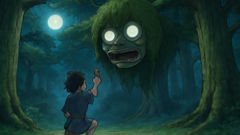
He made his way to the oldest part of the forest, where trees rose so high their crowns vanished into darkness. Here, he found the cedar marked with deep scars—his father’s last known spot. Riku knelt, pressing his palm to the gouged bark, and murmured a prayer. Then he sat, waiting, clutching his talisman. Time slowed. The woods fell silent save for the quiet drip of water from a broken branch. Hours passed; the moon struggled to pierce the clouds. Then, without warning, a cold rush swept through the clearing. The trees swayed as if bowing to something unseen. Riku felt a presence above.
He looked up—and saw it. A massive head, shaped like a bucket but covered in matted black hair and moss, hung suspended from the highest branches. Its mouth yawned wide, lips cracked and glistening, as if it had just licked dew from the leaves. Glowing eyes stared down at him. Riku froze, fear rooting him to the spot. Yet he remembered Kenta’s words: 'The tsurube-otoshi is memory.' Summoning every scrap of courage, he forced himself to speak.
He addressed the monster with honorifics and respect, offering his talisman and reciting his grandmother’s song. For a moment, nothing happened. Then, a voice—deep as thunder—echoed from the yokai: 'Why do you disturb my slumber? Why do you bring offerings so late?' Riku, trembling, explained how the village had forgotten its promises but wished to remember, to mend what had been broken. He pleaded for his father and the others to be spared.
The tsurube-otoshi seemed to consider. It spoke of the old ways, of forests cut and rituals neglected, of pain echoing through roots and branches. Yet, it sensed Riku’s sincerity. 'Prove your respect,' it intoned. 'Restore what was lost. Only then will I release those I have claimed.' With that, the monster withdrew into the shadows, and the forest shuddered as if exhaling a centuries-old breath.
Riku returned at dawn, shaken but unharmed. He told Kenta and the elders what had happened. Together, they revived forgotten rituals, restored sacred groves, and held a festival honoring the spirits. Offerings were placed at every cedar; children learned the old songs anew. Days later, as the village gathered for evening prayers, Riku’s father and Shiro stumbled from the forest, dazed but alive, memories clouded by mist and dreams. The village rejoiced. The forest’s oppressive silence lifted, replaced by birdsong and a gentle wind through the leaves. Riku knew the balance had been restored, but he would never forget the monster’s warning—or the lesson hidden in its shadow.
The Legacy of Shadows and Song
In the weeks that followed, Hanamori transformed. The villagers, once anxious and withdrawn, embraced the forest with fresh reverence. Children ran beneath the cedars by daylight, singing songs their grandparents had taught them. The village shrine, long neglected, filled with fresh offerings—rice cakes, sake, and woven charms hung with red string. Each family took turns tending to sacred groves, sweeping paths and repairing torii gates swallowed by ivy.
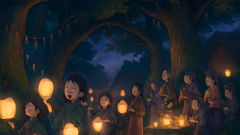
Riku became a quiet hero, though he seldom spoke of his night beneath the trees. He often visited Kenta, who taught him more about spirits and the fragile thread connecting nature and humankind. The shrine keeper explained how yokai like the tsurube-otoshi acted as guardians—harsh but just—reminding people not to take more than they gave. Riku listened and learned, his fear turning to respect.
Occasionally, travelers passing through Hanamori would ask about the talismans and songs drifting on the breeze. The villagers would smile and share what they could, careful to keep certain secrets close. The tale of the tsurube-otoshi grew into a story of hope: how even in darkness, courage and humility could mend what was broken.
One winter, when snow blanketed the mountain and silence reigned in the forest, Riku stood beneath the oldest cedar. He felt a presence overhead—a weight in the branches—but no terror stirred his heart. Instead, he bowed low and whispered his thanks. The wind rustled the leaves in reply. From that day, no one vanished in Hanamori. The village thrived, its fields rich with harvest, its woods alive with laughter.
And yet, each year as autumn returned and shadows stretched beneath the cedars, Riku led the children in song at dusk, lanterns glowing gold in the gathering night. The monster in the trees had become a memory, woven into story—a warning and a blessing. In the hush before sleep, parents would whisper: 'Remember the tsurube-otoshi. Respect the forest, honor your promises, and never forget that you share this world with things unseen.'
So the legend endured. The villagers understood that monsters can be protectors when honored, and that nature’s darkness holds lessons worth learning. And in Hanamori, where shadows danced among ancient cedars, the bond between people and spirits grew deeper than roots, strong enough to weather any storm.
Conclusion
The tale of Hanamori and the tsurube-otoshi lingers like mist at dawn, gently reminding all who hear it that true harmony springs from respect—both for nature and for the spirits that dwell unseen in its depths. Riku’s journey from fearful curiosity to courageous peacemaker echoes through the generations, teaching children and elders alike that legends are more than warnings; they are invitations to remember our place in a living world. By honoring ancient traditions and seeking balance, the villagers found safety not by driving away the mysterious, but by welcoming it as part of their heritage.
To this day, the story is told around glowing hearths or under starlit skies—sometimes as a caution, sometimes as comfort. Its message endures in every lantern lit at dusk, every song offered beneath ancient cedars, and every act of kindness to the wild places that cradle our lives. In a world where shadows still shift at the edge of reason, the legend of the tsurube-otoshi encourages us all to look beyond fear, to listen deeply, and to cherish the connection between humankind and nature’s enduring mysteries.

